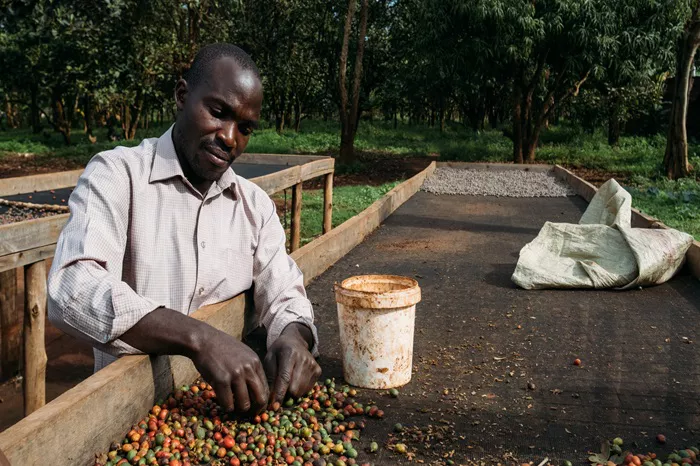Mr. Macharia, along with other local farmers, brings sacks of bright red coffee cherries to a processing plant. The cherries are weighed, and machines remove the red husks. The pale beans inside are washed and moved along concrete channels to drying platforms that stretch across the valley.
Here, workers sort the beans into different grades. The highest-quality beans are sent to coffee houses in Europe.
“We call coffee the black gold around here,” says Mr. Macharia, whose 2.5-hectare farm grows Kenya AA coffee beans. These beans are known worldwide for their rich flavor, deep aromas, and fruity notes. Coffee has been grown in this lush highland area since the late 1890s, when British colonial settlers introduced it.
Today, the area is famous for its top-rated coffee.
Growing coffee is a lot of work. Farmers must pick, prune, weed, spray, fertilize, and transport the crops. “Coffee requires your full-time attention, especially when it begins to bloom,” Mr. Macharia says. “From that moment until harvest day, your full-time job is on the farm.”
It takes four years for coffee trees to mature, making them a significant investment for farmers. But the payoff can be hard to come by. While a cup of coffee in a European café costs around $4, many Kenyan coffee laborers earn just $2.30 a day.
Edita Mwangi, who picks coffee cherries on a hillside overlooking the plant, knows this struggle well. “They don’t know the poverty we suffer,” she says. “You have to struggle day and night just to survive.”
With four children to care for, Ms. Mwangi works six days a week and earns only $1.40 a day. She also walks 5 km to reach the farm where she works.
Farmers have long complained about the trading system between Kenya and Europe, the world’s largest coffee market. They say it’s unfair and doesn’t give them a fair share of the profits.
Now, climate change is adding to their challenges. Coffee trees are sensitive to small changes in temperature and weather. They need a stable climate with humid conditions and regular rainfall to thrive.
“Climate change is a major challenge for our coffee farmers,” says John Murigi, chairman of the Komothai Coffee Society, which represents 8,000 farmers like Mr. Macharia. “Cold temperatures and erratic rainfall are damaging the coffee plants.”
As a result, coffee production has been declining in recent years. Climate change is also making it easier for diseases to spread, including coffee leaf miners and coffee berry disease, a fungal infection that can destroy up to 80% of crops.
To fight these outbreaks, farmers are using chemicals like herbicides and insecticides, which can harm the soil and pose health risks. Some of these products, like Roundup, contain glyphosates that are banned in some European countries because they are linked to cancer.
The Pest Control Products Board of Kenya, which regulates pesticide use, did not respond to a BBC request for comment.
Related topics:
- Tulabati Badanayak’s Journey in Sustainable Coffee Farming
- NESCAFÉ Plan Wins ‘Award of the Year’ for Sustainable Farming Impact
- Kenyan Farmers Boost Coffee Profits with New Processing Goals


